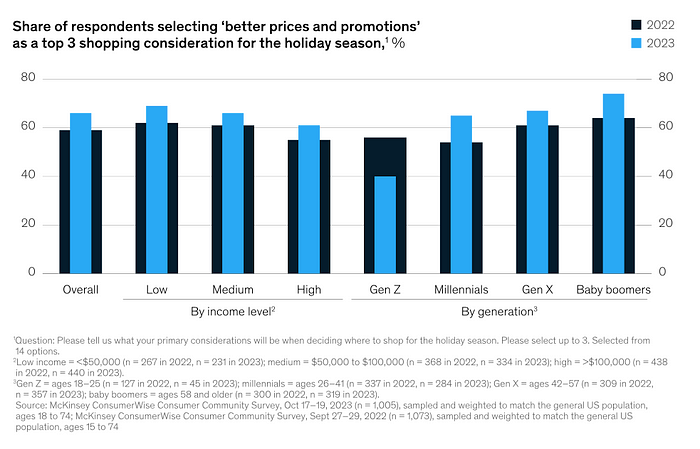At the corner of Thanksgiving, let’s take a look at the early stages of holiday retail trends, particularly how a year of economic uncertainty and summer has influenced this year’s shopping behavior.
More price and value-driven than ever
For many American consumers, rising economic pressures have been a defining feature of 2023. Factors such as persistent inflation, rising interest rates, and geopolitical tensions have created a challenging environment for households nationwide. In response, many have chosen to escape reality by spending significant time on in-person entertainment events (like concerts and sports games), leading to a summer of “Furefration,” a term referring to the rising costs of leisure activities and experiences.
It’s no surprise that all these factors have put pressure on holiday shopping budgets, making it more important for shoppers to be mindful of their spending this year. Unsurprisingly, a recent McKinsey survey found that 79% of American consumers plan to trade down this holiday season, opting for cheaper alternatives, an increase of 5% from 2022. Across generations, while Gen Z tends to prioritize “pricing and promotions” less than other factors, they are also considering cutting back on spending.

However, there is no doubt that this reactive price consciousness among holiday shoppers does not mean people will completely abandon holiday shopping. According to NRF estimates, overall holiday spending in 2023 is expected to increase by 3% to 4% compared to 2022. Specifically, e-commerce sales are projected to grow faster than overall sales, with a year-on-year increase of 7% to 9%.
As a result, consumers are embracing a higher-value mindset when it comes to holiday shopping this year. They are researching online and in-store and making deliberate purchases. They are seeking gift inspiration from lifestyle influencers they follow to using generative AI for gift suggestions.
Thus, the indulgence of the pandemic era is outdated, as McKinsey survey data shows that the percentage of consumers intending to splurge on themselves or others has dropped from 39% in 2022 to 35% in 2023. This decline is primarily driven by Gen Z, which represents a 12% decrease in consumers intending to splurge.
Additionally, many value-driven consumers are turning to resale items as a smart way to save this holiday season. Salesforce predicts that 17% of gifts this holiday season will be resale items, saving 32 billion pounds from landfills. With the ongoing emphasis on sustainability, many brands and retailers are embracing the practice of reselling items returned by customers.
A notable example is Coach featuring a “recycled” bag section on its website, selling new products made from redesigned and reimagined previously owned items. This innovative product not only emphasizes a commitment to sustainability but also provides compelling reasons for customers to revisit the site, potentially leading to more purchases. Similarly, popular resale platform Poshmark is hosting live events and encouraging shoppers to embrace circular fashion this holiday season.
“Holiday creep” meets creative pragmatism
The lengthening of the holiday season is no secret. This extension of the holiday, sometimes referred to as “holiday creep,” is primarily attributed to early deals offered by major retailers. For example, Macy’s launched Black Friday events throughout November and introduced early holiday deals, while Amazon rolled out early Black Friday deals. Some analysts even argue that Amazon’s second Prime Day sale in mid-October marked the start of holiday sales this year.
Interestingly, Walmart’s Mean Girls-themed holiday ad campaign—featuring a reunion of the cast from the 2004 cult classic—could be considered the most lively holiday retail event of the year so far, all about hammering home the message that retail giants are now dropping “Black Friday deals” throughout November.
As a result, consumers are strategically managing their holiday budgets and taking advantage of early deals. According to data collected by Adobe, American shoppers spent a record $76.8 billion online in October alone, an increase of $4.3 billion from last year. They are also becoming increasingly savvy about the timing of their purchases, with many now looking to score deals well outside the traditional holiday shopping window.
A recent YouGov survey found that 52% of American shoppers plan to skip this year’s Black Friday sales, citing past in-store experiences and a lack of trust in the deals offered; in fact, only 17% of shoppers believe they can find real discounts on Black Friday.
This trend, along with the aforementioned value-driven mindset, aligns with what Accenture refers to as “creative pragmatism,” which includes a reversal of the “shopping ahead” trend from previous years. Accenture’s survey found that 51% of American shoppers plan to start their holiday shopping in November or December. Other manifestations of this pragmatic attitude include a willingness to compromise on convenience, with 54% of respondents indicating they would make purchases throughout the year, such as board games or video games, if it could save them money.
With a more spread-out holiday shopping experience, consumers also have more time to research to ensure they get the best value for their money, thereby curbing impulse purchases. In response to this value-driven and pragmatic mindset, retailers will need to do more than just offer frequent discounts to win over holiday shoppers. For example, loyalty programs are becoming increasingly important, allowing retailers to gain nuanced, data-driven insights into each consumer and provide timely rewards to those who have already made purchases, leveraging the extended holiday for repeat purchase opportunities.
Moreover, the extended holiday may also mean more time as retailers blend unique in-store experiences to attract customers. These range from holiday-themed events to interactive product demonstrations, making shopping a more engaging and memorable experience. The viral Chinese e-commerce app Shein is taking over Forever 21’s Times Square store to host a “Holiday Home” pop-up experience, which includes an interactive game room where customers can play for gift cards. As shoppers respond to the pressures of pragmatism and savings, retailers have the opportunity to inspire customers through storytelling and immersive experiences.
Technology-driven shopping experiences enhance value
When it comes to experiential retail, a significant portion of the attention and engagement in retail experiences today comes from novel, innovative experiences powered by emerging technologies (such as augmented reality, the metaverse, and generative AI). Retailers are increasingly leveraging these technologies to create immersive and interactive experiences that go beyond traditional shopping, and this holiday season is no exception.
For example, Lego utilizes AR to create a digital snowball fight across the Atlantic, part of LEGO’s larger “Play is Your Superpower” campaign, showcasing how AR can transform traditional marketing efforts into interactive and globally accessible experiences. By creating this AR experience, Lego goes beyond selling products to offer a playful and immersive experience that blurs the lines between digital and physical play.
Similarly, J. Crew has launched a holiday-themed virtual store that elevates the concept of experiential retail to a new level. The virtual store serves as a snow lodge for women’s wear and a ski cabin for men’s wear. This immersive virtual store aligns with how other brands are exploring early metaverse platforms, providing customers with an engaging shopping environment that is far removed from typical e-commerce sites. Enhanced by treasure hunts and an AI holiday card generator, the experience makes the shopping journey more interactive and personalized. This not only enhances brand engagement but also creates a memorable shopping experience that customers are likely to share and talk about.
Speaking of AI, this year’s hottest innovative concept is sure to impact the holiday shopping experience as well. Google’s AI-driven “Search Generative Experience” aims to provide more comprehensive and informative search results in a chat format, adding an option for shoppers to use AI to generate gift ideas and items to assist with online shopping.

Upcoming features, set to launch in December, will allow users to create real images simply by describing the clothing they are interested in, such as “colorful, patterned puffer jacket.” After that, it enables them to find and purchase real products online that resemble the items they envisioned. Users will have the ability to refine their inputs to ensure the generated images accurately match their specifications. They can then explore a range of purchasable products that closely reflect the styles they want, choosing from 35 billion options available in Google’s shopping database.
Additionally, Google has also added new AI features aimed at helping small businesses stand out more during the holiday season on Search and Google Maps. Now, U.S. businesses in Merchant Center can add a “small business” attribute to their listings, displayed with icons and labels, making it easier for shoppers to find them. Furthermore, Google has partnered with Etsy to introduce an AI-driven product studio for creating product images with text-to-image AI for experimental scenes, similar to what Amazon just announced for its products.
Overall, this holiday season marks a significant evolution in retail, with AR, AI, and immersive experiences leading the charge. They offer consumers a blend of entertainment, personalization, and convenience, transforming the traditional shopping experience into an engaging and memorable journey.
Want to learn more?
In summary, the 2023 holiday shopping season reflects a landscape where economic challenges have led to more conscious and value-driven consumer behavior. In response, retailers are innovating with technology, creative marketing, and strategic promotions to attract and retain customers in this evolving retail environment.
If you want to learn more about the latest retail trends and technology-supported shopping experiences, please reach out to Chelsea Freitas (chelsea@ipglab.com) to start a conversation.
